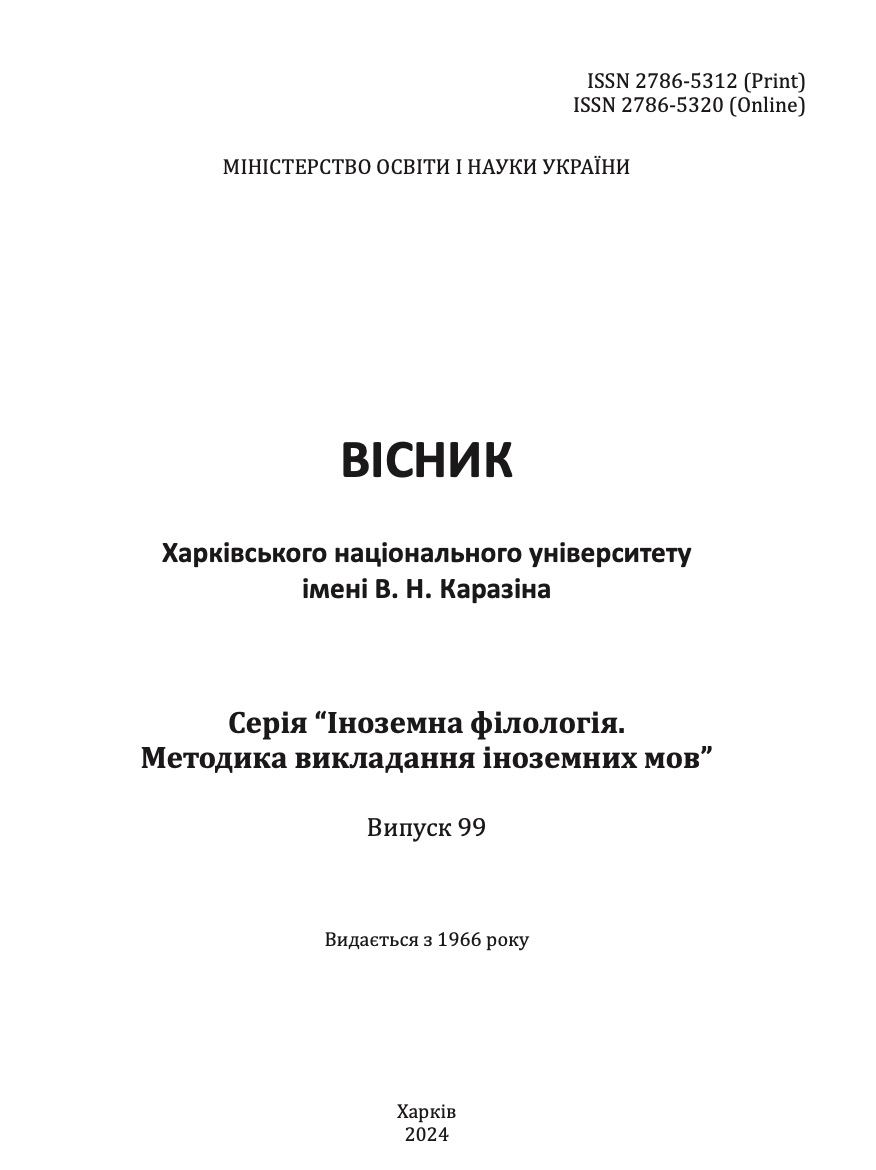Valorativity of time-remote source text as a problem of cognitive-discursive Translation studies (case study of Ukrainian retranslations of Shakespeare’s Tragedies)
Abstract
The article addresses an issue of reproduction of evaluation category in the translated text drawing on cognitive-discursive translation studies. The objective of the study is to reveal the potential of valorativity of the units of the original and justify the ways of translational reproduction of this potential in units of translation in terms of the cognitive-discursive paradigm. This is a case study of the tragedy “Macbeth” by W. Shakespeare (1605) as a time-remote original work and its Ukrainian retranslations, the authors of which are Panteleimon Kulish (1900), Todos Osmachka (1930), Yurii Koretskyi (1940), Borys Ten (1986), Oleksandr Hryaznov (2008). The article substantiates the definition of new terminology, namely “cognitive-discursive translation studies”, “valorativity”, “valorative cognitive variant”. The article focuses on the nature of cognitive-discursive paradigm, which is rooted in the interaction of language structures and cognitive processes. The paradigm proves to be the most relevant for considering the valorativity of the text, as it studies it in the context of human cognitive activity and takes into account the impact of linguistic elements on the perception and interpretation of the text. The article reveals that the effectiveness of the selection of means for the reproduction of valorativity of a time-remote original work is determined by the general cultural code of the authors of retranslations and the nature of the translators’ idiostyle and individual authorial worldview. The study affirms that both lexical- semantic and lexical-grammatical transformations were effective in translating evaluative units of the original text using valorative cognitive variants. At the same time, the valorative potential of the original unit when using valorative cognitive variants is either strengthened, or weakened, or transformed as the opposite one.
Downloads
References
Bilodid, I. K. (1970-1980). Slovnyk ukrains’koi movy v 11 t. [Dictionary of the Ukrainian language]. Kyiv: Naukova dumka.Retrieved from: http://sum.in.ua/ (in Ukrainian)
Boiko, Ya. V. (2013). Estetychna otsinka u poetychnomu tekstiv: linhvokohnityvnyj analiz (na materiali liryky anhlijs’koho romantyzmu). (Dys. kand. filol. nauk) [Aesthetic Evaluation in English Romantic Lyrics: A Linguo-Cognitive Analysis]. (Doctor of Sciences in Philology Thesis). Donets’kyj natsional’nyj universytet, Donets’k. (in Ukrainian)
Boiko, Ya. V. (2023). Kohnityvno-dyskursyvna model’ diakhronnoi mnozhynnosti perekladiv chasovo viddalenoho pershotvoru (na materiali ukrains’kykh retransliatsij trahedij V. Shekspira ХІХ–ХХІ). (Referat doktorskoj dysertatsii) [Cognitive-Discursive Model of the Diachronic Plurality in Translation of the Time-remote Original Text (case study of Ukrainian Retranslations of W. Shakespeare’s Tragedies of the 19th–21st centuries)]. (Philology doctoral thesis synopsis): Kharkivskyi natsionalnyi universytet imeni V. N. Karazina, Kharkiv. (in Ukrainian)
Chabanenko, V. A. (2002). Stylistyka ekspresyvnykh zasobiv ukrains’koi movy [Stylistics of expressive means of the Ukrainian language]. Zaporizhzhia: ZDU. (in Ukrainian)
Ivanenko, S. M. (2001). Otsinnyj komponent znachennia movnoi odynytsi iak odyn iz zasobiv eksplikatsii tonal’nosti tekstu [The evaluative component of the meaning of a linguistic unit as one of the means of explicating the tonality of the text]. Problemy semantyky slova, rechennia ta tekstu [Problems of word, sentence and text semantics], 5. (in Ukrainian)
Lazarus, R. S. (1974). Cognitive and Coping Processes in Emotion. Cognitive Views of Human Motivation. New York: Academic Press.
Merriam-Webster’s Dictionary. URL: https://www.merriamwebster.com/dictionary/
Prykhod’ko, H. I. (2016). Katehoriia otsinky v konteksti zminy linhvistychnykh paradyhm: monohrafiia [Evaluation category in the context of changing linguistic paradigms]. Zaporizhzhia: Kruhozor. (in Ukrainian)
Tkachuk, V. M. (2003). Katehoriia sub’iektyvnoi modal’nosti [Category of subjective modality]. Ternopil’. (in Ukrainian)
Shekspir, V. (1900). Makbet [Macbeth]: per. P. Kulisha. L’viv (in Ukrainian)
Shekspir, V. (1986). Makbet [Macbeth]: per. T. Os’machka. Dnipro (in Ukrainian)
Shekspir, V. (2000). Makbet [Macbeth]. per. O. Hriaznova. Retrieved from: https://ukrlib.com.ua/world/printit.php?tid=9050 (in Ukrainian)
Shekspir, V. (1986). Makbet [Macbeth]: perek. z anhl. B. Ten. Dnipro (in Ukrainian)
Shekspir V. (1940). Makbet [Macbeth]: per. Yu. Korets’koho. Kyiv: Derzhavne vydavnytstvo «Mystetstvo». (in Ukrainian)
Shakespeare, W. (1899). Macbeth. In R. G. White. (Eds.), The Complete Works of William Shakespeare (pp. 423–533). New York: The University Society.




